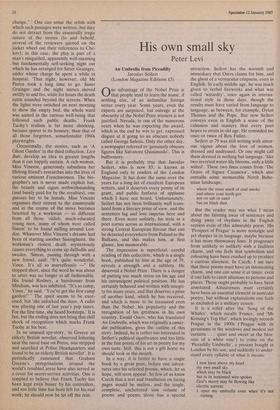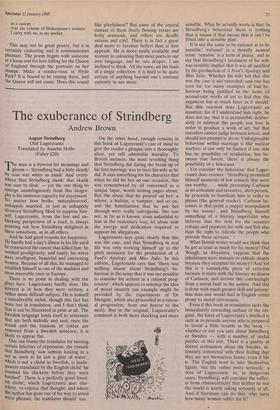His own small sky
Peter Levi
An Umbrella from Piccadilly Jaroslav Seifert (London Magazine Editions £5)
One advantage of the Nobel Prize is that people tend to learn the name, if nothing else, of an unfamiliar foreign writer every year. Some years, even the experts are surprised, but outrage at the obscurity of the Nobel Prize winners is not justified. Neruda, in one of the numerous years when he was expecting the award, which in the end he was to get, expressed disgust at it going to an obscure nobody called George Seferis. Only the other day, a newspaper referred to 'genuinely obscure figures like Salvatore Quasimodo'. This is buffoonery.
But it is probably true that Jaroslav Seifert, who is now 83, is known in England only to readers of the London Magazine. It has done the same over the years for a long list of excellent European writers, and it deserves every penny of its grant, and public fanfares of applause which I have not heard. Unfortunately, Seifert has not been brilliantly well trans- lated from a literary point of view, and the sentences lag and lose impetus here and there. Even more unfairly, his style as a poet comes across as international, with a strong Central European flavour that can be detected everywhere from Poland to the Balkans, and this makes him, at first glance, less memorable.
The impression is superficial; careful reading of this collection, which is a single book, published by him at the age of 79, reveals a strength and a subtlety. He deserved a Nobel Prize. There is a danger of putting too much stress on his age and his intransigent political position. He has certainly behaved and written with integri- ty for many years, and that deserves a prize of another kind, which he has received, and which is more to be treasured even than the Nobel: his popularity and the recognition of his greatness in his own country. Ewald Osers, who has translated An Umbrella, which, was originally a samiz- dat publication, gives the outline of this story. Indeed, he is rather too interested in Seifert's political significance and too little in the fine points of his art in poetry for my own taste. Still, this is not a gift horse we should look in the mouth.
In a way, it is better to have a single book by a great poet, before one adven- tures into his selected poems, which, let us hope, will soon appear. So few of us know Czech that a text and translation on facing pages would be useless, and the single, complete, uncluttered slim volume of poems and poems alone has a special attraction. Seifert has the warmth and immediacy that Osers claims for him, and the ghost of a vernacular crispness, even in English. In early middle age, he was much given to verbal fireworks and what was called 'wizardry', once again in interna- tional style in those days, though the results must have varied from language to language, as between, for example, Dylan Thomas and the Pope. But now Seifert conveys even in English a sense of the calmness and mastery that every poet hopes to attain in old age. He reminded me once or twice of Roy Fuller.
Seifert at 79 was still writing with amor- ous vigour about the love of women, dressed and undressed. Or one might call them dressed in nothing but language, 'like two inverted water-lily blooms, only a little wilted'. These two lines comes from 'The Grave of Signor Casanova', which also contaihs some memorable North Bohe- mian landscape,
where the roses smell of coal smoke
and where your teeth grit not on salt or sand but on black dust.
But the reader may see what I mean about the fainting away of sentences and dying away of rhythms in the English version even of this Admirable poem. His 'Prospect of Prague' is more nostalgic and yet sharper in its language, maybe because it has more throwaway lines. It progresses from unlikely to unlikely with a faultless charm, and one feels that symbolism and colouring have been crushed up to produce a curious aliveness. In Czech, I am sure that these poems must have an intoxicating charm, and one can sense it at times, even if one fails to catch allusions to persons and places. Those ought probably to have been annotated. Allusiveness must certainly have been an essential element in samizdat poetry, but without explanations one feels as excluded as a military censor.
It is a relief after the 'Song of the Whales', which recalls France, and `Mr Krosing's Top Hat', which lovingly records Prague in the 1900s (Prague with its geraniums in the windows and modest net curtains . . . quiet and sweet as the blos- som of a white rose') to come on the 'Piccadilly Umbrella', a present bought in London by his son, and suddenly to under- stand every syllable of what it means:
I now have above my head
my own small sky which may be black but in its tensioned wire spokes God's mercy may be flowing like electric current.
1 open my umbrella even when it's not raining as a canopy over the volume of Shakespeare's sonnets I carry with me in my pocket.
This may not be great poetry, but it is certainly endearing and it communicates Pleasure. The poem begins with someone at a loose end for love falling for the Queen of England through the portraits on her stamps. Make a rendez-vous in Hyde Park? It is bound to be raining there, and the Queen will not come. Does this sound like playfulness? But some of the central stanzas of these freely flowing verses are hotly sensuous, and others are deadly serious and cold. There is in fact a great deal more to Jaroslav Seifert than at first appears. He is more easily available and warmer in colouring than most poets in our own language, and he cuts deeper, I am inclined to think. All the same, on the basis of a single collection, it is hard to be quite certain of anything beyond one's extreme curiosity to see more.







































 Previous page
Previous page